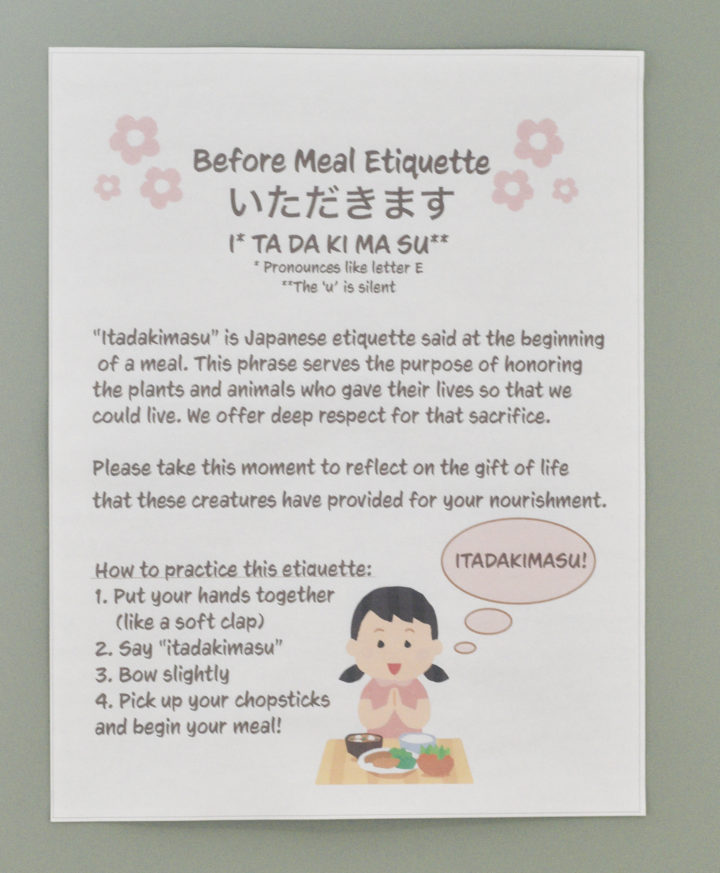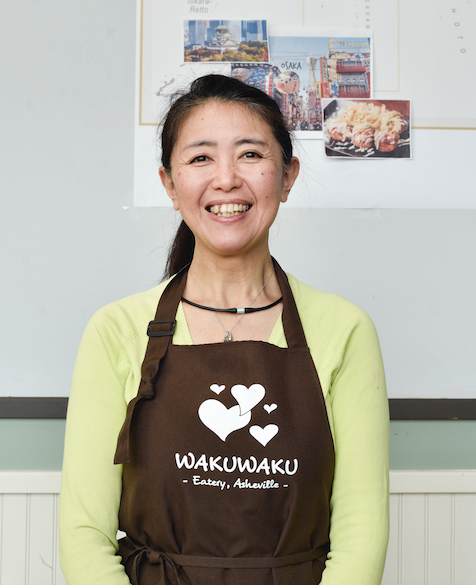“These are good with the tea — if you eat sugar, that is,” says the Rev. Teijo Munnich before biting into one of the animal-shaped cookies she has offered to the handful of women gathered around the table at Great Tree Zen Temple.
Though not a formal lesson in mindful eating, Munnich’s easy smile and calm demeanor serve as invitation enough to slow down and fully enjoy the simple pleasure of tea and cookies. The modest table and carefully labeled drawers in the nearby kitchen reflect the order and simplicity one might expect of a Zen temple, while the warm wood walls and fireplace hint that this is also home for Munnich and the other women currently in residence at the temple in Alexander.
This balance of austerity and comfort often characterizes the practice of mindful eating, which can include simplifying the diet while simultaneously focusing on the sensations of consuming food. The exercise of being fully present for meals has long been an essential part of the lives of spiritual practitioners such as Munnich. But in recent years, mindful eating has gained wider attention among those looking for a back-to-basics approach to healthfully enjoying food, particularly during the holidays.
Focusing on the food
Joshua Herr, director of clinical operations at the Chinese Acupuncture and Herbology Clinic on Montford Avenue, often encounters patients who are curious about mindful eating. His advice is simple: “Eating should be about eating.”
Herr discourages eating while driving, standing, studying or doing other activities. He recognizes that focusing exclusively on eating can be difficult when stressed or tempted to overindulge on holiday foods. However, he maintains that eating while distracted or overeating can lead to digestive problems that compromise health. Furthermore, eating with intention, he says, can help people recognize when they’ve consumed an appropriate amount.

Indeed, it’s not uncommon for people to eat less when they practice mindfulness at meal times, says Munnich. Based on observations from years of participating in silent meditation retreats, Munnich says people often reach for more or larger portions when distracted by conversation. “People tend to eat about twice as much when talking compared to silent meals,” she says, adding that the discrepancy is so reliable, kitchen workers now plan for it.
Of course, discussions with fellow diners are sometimes the least of what can divert our minds from the food on our plates. The Rev. Daigaku Rummé, leader of Confluence Zen Center in Missouri and a recent guest speaker at Great Tree, hesitates when asked about having phones out or televisions on while eating. Putting screens away during meals “just goes without saying,” he says, adding that mindful eating starts with extremely simple steps.
For example, Rummé points out that laying out the entire meal before sitting down relieves the need to repeatedly leave the table. Simply sitting down to eat (as opposed to standing) is also recommended by Rummé as a way to focus the mind on the meal. Finally, Rummé stresses the importance of expressing gratitude before and after meals, a practice he acquired in Japan, growing up as the son of a Christian missionary.
Traditions of mindfulness
Acknowledging the efforts of those who grow, make and serve the food we receive is a Japanese practice chef Naomi Mikami shares with those who enter her North Asheville restaurant, WakuWaku. The eatery specializes in traditional Japanese comfort food with a focus on healthful nourishment. “We want to serve food that is healthy so our customers are healthy – physically healthy, mentally healthy, everything,” says Mikami.
She recalls recovering from a serious childhood illness with the help of her mother and grandmother, who took time to carefully prepare nourishing meals. “That’s how I got better, and that’s who I learned from,” she says. Since opening in May, Mikami and her staff members have made efforts to share many aspects of Japanese culture, including the practice of mindful eating.
Posted in WakuWaku’s dining area are posters that explain the traditional Japanese way of showing gratitude for food, including instructions for using the gestures and phrases that open and close each meal in Japan. Mikami sees gratitude as an integral part of practicing mindfulness and hopes customers use the posters to more fully enjoy their dining experience. “To us, mindful eating starts with thanking all the beings who contribute to a meal,” she says, adding that gratitude is a practice available to all, regardless of dietary preferences.
In Chinese medicine, choosing healthful foods and preparing them mindfully are also components of mindful eating, according to Herr. “What to eat can be very individualistic,” he explains, “but generally, cold foods are best avoided, as are sugary foods.”
He also points out that the sugary treats often associated with the holidays can have unwanted effects. “Sugar can disrupt how nutrients are used in the body, so they are definitely not ideal,” Herr says.
Acknowledging effort
What to eat is also very much on the mind of Norma Bradley, a multimedia artist and poet ordained in the Buddhist tradition. Bradley and her husband moved from Manhattan to a farm just outside Asheville after a visit to WNC almost 40 years ago. Farm life has provided Bradley with firsthand knowledge of food production, from animal husbandry to canning vegetables.

The experience, she says, continues to inform her preference for a vegetarian diet and her deep appreciation for the unseen efforts a plate of food requires. Her practice of mindful eating includes pausing before each meal to consider those who made it possible. She describes deeply “settling in” to dinner each night by first acknowledging the contributions of the earth and the various people whose work helps feed her.
This explicit acknowledgment, says Bradley, makes her feel more aware of the present moment and often allows her to feel satisfied with less. “I made one plate of food at Thanksgiving and just said, ‘That’s enough. I don’t need any more.’ And I didn’t. I was satisfied,” she recalls.
Such eating habits, however simple, are often outside the mainstream, says Susan Hale, a leader of Open Circle, an Asheville mindfulness group that welcomes folks with all levels of meditation experience. Hale’s leadership role and her experience as the mother of a diabetic have helped shape her approach to eating.
The pervasiveness of vending machines, distractions and busy schedules, she says, can make mindful eating a challenge. “Self-compassion and a sense of humor go a long way, I’ve found,” she says, adding that eating mindfully all the time may not be realistic for the average person immersed in modern life — especially during the holidays. Both she and Bradley stress the importance of letting go of the guilt often associated with less-than-mindful eating habits that may have been established long ago.
For those interested approaching meals with more awareness, Hales recommends thinking of mindful eating as a “North Star” – a tool for guidance along the path toward greater self-awareness rather than a destination itself.
Bradley agrees. “It’s all about becoming more aware. Once you’re aware of your habits, then you have a choice.”



Before you comment
The comments section is here to provide a platform for civil dialogue on the issues we face together as a local community. Xpress is committed to offering this platform for all voices, but when the tone of the discussion gets nasty or strays off topic, we believe many people choose not to participate. Xpress editors are determined to moderate comments to ensure a constructive interchange is maintained. All comments judged not to be in keeping with the spirit of civil discourse will be removed and repeat violators will be banned. See here for our terms of service. Thank you for being part of this effort to promote respectful discussion.